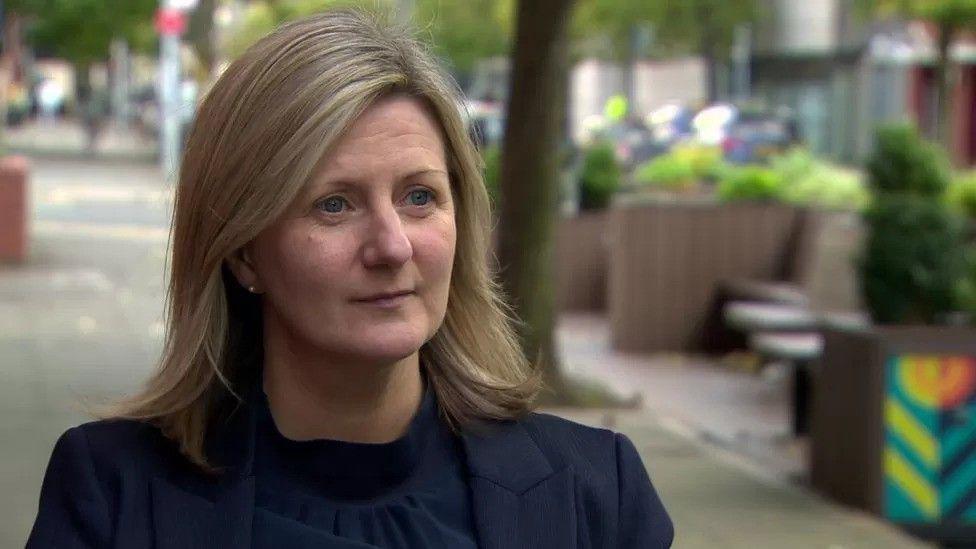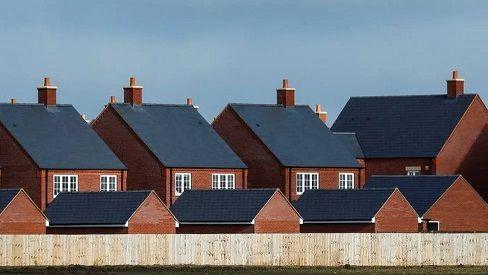Service cuts within months, warns Housing Executive

NIHE chief executive Grainia Long says the lack of appropriate funding will be felt in a number of sectors
- Published
"Insufficient" budget proposals will lead to cuts to services - including social housing - as early as October, the Northern Ireland Housing Executive (NIHE) has warned.
The Department for Communities (DfC) was given £111m - or 15.5% - less in day-to-day spending than what it asked for.
NIHE - which gets most of its funding from the DfC - said this meant only 400 new social homes would be built in 2024-25 rather than the target of 2,000.
It has outlined a number of expected cuts, such as "greatly reduced" homelessness services.
NIHE set out the warnings in a response to the recent Department for Communities Budget Equality Impact Assessment.
The DfC said its resource budget had been cut by 30.9% over the past decade, leading to cuts across its department.
NIHE said the Affordable Warmth Scheme, external, which helps people on lower incomes with the costs of energy efficiency measures, would be reduced by £6.8m.
This would mean 53% fewer households would be able to use the scheme.
Other services "significantly" affected would include energy efficiency grants, supporting people, staff costs and services in emergency situations.
Longer waits for social housing
Grainia Long, NIHE's chief executive, said the lack of funding for new-build social housing will mean people will not only be waiting longer, but will be living in temporary accommodation for longer as well.
Speaking to BBC News NI's Good Morning Ulster programme, Ms Long said this in turn will have a "significant impact" on construction jobs.
"It will take somewhere between 80 and 90 million pounds out of the construction industry," she said.
"That will have a really significant impact on our economy and this is not something that is coming down the road, this is happening right now."
As the new build programme is spread regionally, Ms Long explained, the affects will be felt "very locally".

This is not the first time housing targets will be missed by NIHE.
Last year, it had hoped to build 2,000 new houses but due to budget constraints, it fell 500 short.
Ms Long said this will be the second year in a row where there will be a downturn in houses built, with a target of 400-600 houses being a "really serious" problem.
Out-of-hours service facing closure
The funding deficit will also have an impact on homelessness services, the numbers of which have increased "significantly" since the Covid-19 pandemic, Ms Long said.
Extreme weather event services, such as cold snaps during the winter, will also face disruption.
"The kind of questions I’m going to have to take in the next few months will be do we close services, and we will have to close services provided by voluntary community sector organisations to people who are homeless," she added.
"We are looking currently at our own out-of-hours service that will have a significant impact so we may be in a position whereby we have to reduce or close that service."
Ms Long said the impacts will be felt "immediately" for a range of people.
"I think this needs to be understood as not just a problem for the Housing Executive and those on the waiting list and those who need homelessness services, but this will have a really dramatic impact on the economy and our wider society and most importantly on those in need."
'A 70% cut'
Seamus Leheny, chief executive of the Northern Ireland Federation of Housing Associations, said there is "a staggering gap" between the budget needed and what is available for the construction of homes.
"We commenced work on just shy of 1,500 new homes last year," he told BBC Radio Ulster's Evening Extra programme, but said "we’ll do well to be able to finance the construction of 400" this year.
"So we’re facing really a 70% cut in the construction of new social homes right across Northern Ireland," Mr Leheny said.
"Potentially what we can build this year would only, in theory, really house half of those applicants - and that’s only applicants in the first quarter of this year.
"The gap is only going in one direction and the waiting list is growing, but the budget from government to facilitate homes for people is going drastically in the other direction."
Funding elsewhere
It comes as the Department of Health is to get an extra £122m as part of a Stormont mini- budget.
More than £300m of mostly new money from Westminster has been allocated to Stormont departments in what is known as a monitoring round.
Education will get an extra £88m, about half of which will be used to settle a long-running pay dispute with classrooms assistants and other non-teaching staff.